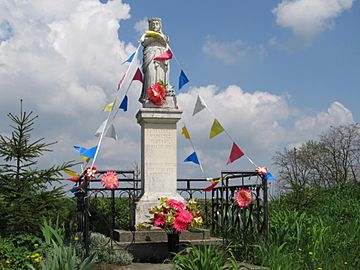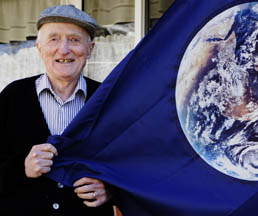Psalm 115 facts for kids
| Psalm 115 | |
|---|---|
| Book | Book of Psalms |
| Hebrew Bible part | Ketuvim |
| Order in the Hebrew part | 1 |
| Category | Sifrei Emet |
| Christian Bible part | Old Testament |
| Order in the Christian part | 19 |
Psalm 115 is a special poem or song found in the Book of Psalms in the Bible. It is the 115th psalm in the Hebrew Bible. The most famous line from it in English is: "Not unto us, O LORD, not unto us, but unto thy name give glory."
This psalm is part of a group called the Egyptian Hallel. This group includes Psalms 113 to 118. These psalms are often sung during important Jewish holidays.
Contents
Different Ways of Counting Psalms
In the Hebrew Bible, Psalm 115 is its own psalm. However, in some older versions of the Bible, like the Greek Septuagint and the Latin Vulgate, the psalms are counted a bit differently.
In these versions, Psalm 115 is actually the second part of Psalm 113. It is counted as verses 9–26 of Psalm 113. The first part (verses 1–8) is what we know as Psalm 114 in the Hebrew numbering. In Latin, this part of Psalm 113 is known as "Non nobis".
Why Was This Psalm Written?
Many experts believe Psalm 115 was written a long time ago. It was likely composed for use in the Second Temple in Jerusalem. This was after the Jewish people returned from being held captive in Babylon.
At that time, the community in Jerusalem was small and not very powerful. They might have felt weak compared to their neighbors. This psalm could have been a way to remind them that God was still with them.
Important Messages and Uses
The first verse of Psalm 115 has been used in many places. You can find it as an inscription on buildings, like the Ca' Vendramin Calergi in Venice, Italy.
Verse 16 says, "The earth has been given to the children of men." This verse helped inspire John McConnell. He was a peace activist who created Earth Day. He wanted people to take care of the Earth and share its resources.
In Jewish Worship
Psalm 115 is a key part of Jewish worship. It is one of the six psalms that make up the Hallel. The Hallel is recited on special days like Passover and Rosh Chodesh (the start of a new month).
On most days when Hallel is said, the entire Psalm 115 is recited. However, on some days, only the first 11 verses are used.
In Christian Worship
Psalm 115 is also used in many Christian church services. This includes the Eastern Orthodox, Catholic, Lutheran, and Anglican churches.
The Latin hymn "Non nobis" is based on Psalm 115. Many religious leaders have used the beginning of this psalm as their personal motto. They did this to show their humility. The first verse in Latin, "Non Nobis Domine," became the motto of the Knights Templar.
King James Version Text
Here is the text of Psalm 115 from the King James Version of the Bible:
- Not unto us, O LORD, not unto us, but unto thy name give glory, for thy mercy, and for thy truth's sake.
- Wherefore should the heathen say, Where is now their God?
- But our God is in the heavens: he hath done whatsoever he hath pleased.
- Their idols are silver and gold, the work of men's hands.
- They have mouths, but they speak not: eyes have they, but they see not:
- They have ears, but they hear not: noses have they, but they smell not:
- They have hands, but they handle not: feet have they, but they walk not: neither speak they through their throat.
- They that make them are like unto them; so is every one that trusteth in them.
- O Israel, trust thou in the LORD: he is their help and their shield.
- O house of Aaron, trust in the LORD: he is their help and their shield.
- Ye that fear the LORD, trust in the LORD: he is their help and their shield.
- The LORD hath been mindful of us: he will bless us; he will bless the house of Israel; he will bless the house of Aaron.
- He will bless them that fear the LORD, both small and great.
- The LORD shall increase you more and more, you and your children.
- Ye are blessed of the LORD which made heaven and earth.
- The heaven, even the heavens, are the LORD's: but the earth hath he given to the children of men.
- The dead praise not the LORD, neither any that go down into silence.
- But we will bless the LORD from this time forth and for evermore. Praise the LORD.
Music Settings
Many composers have set Psalm 115 to music. This means they wrote songs or pieces of music using the words of the psalm.
- Heinrich Schütz created a setting in German called "Nicht uns, Herr." He wrote it for three groups of singers and instruments.
- Johann Sebastian Bach used verses 12 to 15 of Psalm 115 for his early cantata, [Der Herr denket an uns] Error: {{Lang}}: text has italic markup (help). This piece talks about God's blessings, especially for families.
- Joseph Haydn wrote a four-part song for a choir using the first verse in Latin.
- In 1835, Felix Mendelssohn set Psalm 115 in German, titled Nicht unserm Namen, Herr, Op. 31. It was for a soprano singer, choir, and orchestra.
- Gustav Holst also wrote a setting in English called "Not Unto Us, O Lord" in the 1890s.
- More recently, Gerald Cohen set the psalm in Hebrew for choir and piano in 1987.



